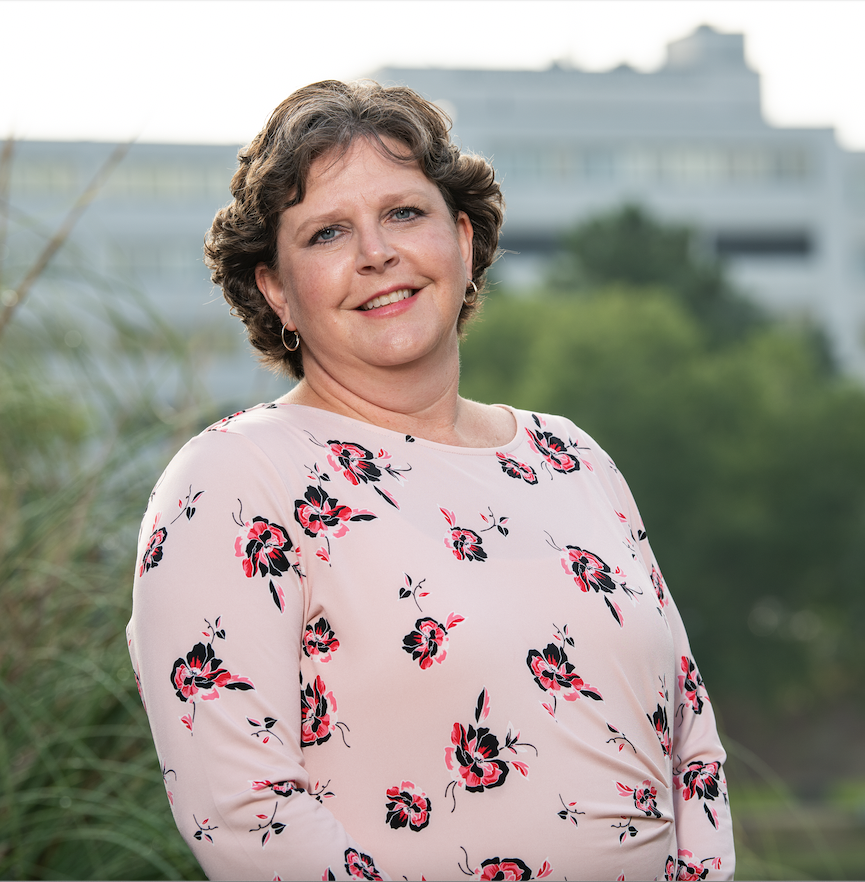Self-Exams Play an Important Role in Detecting Breast Cancer Early
October 14, 2021
Rhonda Platt, RN, BSN, Heart Attack and Heart Failure Coordinator at Aiken Regional Medical Centers, shares her inspiring story of breast cancer survival.
 I was 42 years old when I was diagnosed with stage 1 invasive ductal carcinoma. It was an ER/PR positive type of breast cancer, which means it is sensitive to hormones and can be treated with them, and a fast-growing, grade 3 tumor. Interestingly enough, I had my yearly mammogram in November 2019, and it was normal. But in March 2020, I found a lump while doing a breast self-exam. My doctor sent me for a diagnostic mammogram, followed by an ultrasound and biopsy. My paternal grandmother had breast cancer when she was 46, so I was previously tested and they found I did not have the BRCA gene.
I was 42 years old when I was diagnosed with stage 1 invasive ductal carcinoma. It was an ER/PR positive type of breast cancer, which means it is sensitive to hormones and can be treated with them, and a fast-growing, grade 3 tumor. Interestingly enough, I had my yearly mammogram in November 2019, and it was normal. But in March 2020, I found a lump while doing a breast self-exam. My doctor sent me for a diagnostic mammogram, followed by an ultrasound and biopsy. My paternal grandmother had breast cancer when she was 46, so I was previously tested and they found I did not have the BRCA gene.
I have a long history with my gynecologist and have a well-established care team due to prior breast issues. My doctor gave me the option of a lumpectomy with radiation or a mastectomy, and I chose the mastectomy in April 2020. Because the cancer was a grade 3, they recommended four rounds of chemotherapy. Luckily, the cancer had not spread to any of my lymph nodes.
Because it was during the early days of the pandemic, my husband was not allowed to go into the hospital, so I was dropped off at the front door for my surgery and was sent home the same day. As a nurse at Aiken Regional Medical Centers, I witnessed families losing family members, so I totally understood why he was not allowed.
My biggest issue with the chemo was losing all of my hair, because that was part of my identity. It all did come back, still dark, but now it is curly. This was very hard and emotional for me, but once I grieved it, that was it – I rolled with it and embraced it. I still do have some residual side effects from the chemo, such as insomnia and hot flashes.
I have learned so much from this journey, the biggest thing being that “it is OK to not be OK.” We as women tend to carry a lot on our shoulders and really try to be strong all the time. I learned to allow myself some grace and allow my friends and family to be there for me when I was having a down day or not feeling well. I have worked at Aiken Regional for 16 years, and I totally felt the love and support of my co-workers. I am grateful to work with such caring people. My family and I do come here and we see doctors here as well.
I cannot emphasize it enough – ladies, stay on top of your mammograms and breast self-exams. But most importantly, listen to your body. If something feels off, get it checked. I am glad I did.
The Women’s Breast Health and Imaging Center
The Women’s Breast Health and Imaging Center is a Pink Ribbon Facility and is accredited by the American College of Radiology. The Center offers 3D mammography imaging, which can help detect breast cancer at early stages, when it's most treatable. Other services include diagnostic mammograms, bone density scans and stereotactic biopsies. The Center is the region’s only dedicated, freestanding women's imaging center and features an all-female staff which includes certified mammography technicians, a breast health nurse navigator, and board-certified radiologists and surgeons.
Learn more about breast imaging→
The Cancer Care Institute of Carolina
The Cancer Care Institute of Carolina is affiliated with Aiken Regional Medical Centers and located on the hospital’s main campus. The experienced oncology team offers the same high level of skilled cancer treatment and oncology services found in the nation’s leading cancer institutes and centers.
